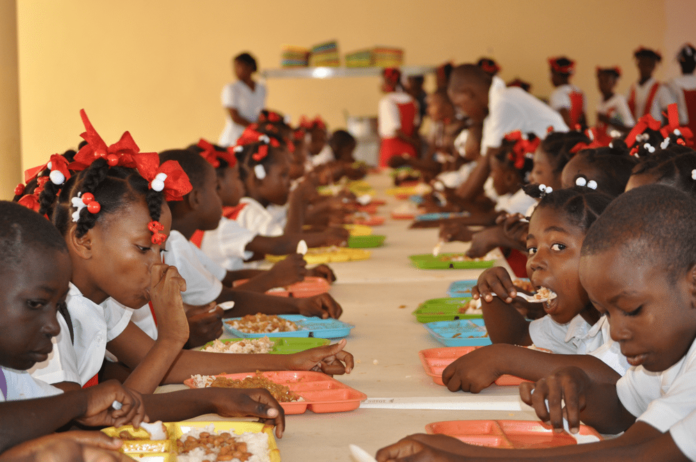Abuja spends N1b daily, but most of it is stolen
By Jeph Ajobaju, Chief Copy Editor
Abuja has increased the cost of feeding a primary school pupil from N70 to N100 per day and plans to spend about N1 billion from this year to feed 10 million children daily countrywide.
“When we started in 2016, that was before COVID-19, we had experienced difficulty with the implementation of the N70/child. We had made presentations as the [Humanitarian] Minister [Sadiya Farouq] passionately made submissions to Mr. President.
“And Mr. President has graciously approved that we should raise the feeding [cost] from N70 to N100 per child. And the implementation of this programme has now commenced,” National Social Investments Programme National Co-ordinator Umar Bindir disclosed in Abuja.
Beset with corruption
But, as is the case in all facets of the Nigerian society, the feeding programme is riddled with corruption and theft of funds.
The Economic and Financial Crimes Commission (EFCC) in 2020 arraigned in court Ishaka Abdullahi, Education Secretary of Sabon Birni Council in Sokoto State, for illegal withdrawal of N429,000 primary school feeding fund.
Vendors have stopped supplying food to schools in Benue, Cross River, Akwa Ibom, Ogun, Enugu, Bauchi, and Kano because of non-payment of their funds.
In some states, teachers and pupils said even when the programme was in operation, food supply was not stable and only a few pupils were served.
Terry Orduen, a primary four pupil of LGEA Primary School, Idemekpe, Makurdi said: “Since the inception of this second term [in 2022] we have yet to see the cooks in our school. In 2021, we were fed for three days a week.”
The primary school feeding programme is different from that of Federal Government Colleges in which N2.67 billion has been stolen, according to the Independent Corrupt Practices and Other Related Offences Commission (ICPC)
“We discovered payments to some federal colleges (secondary schools) for school feeding in the sum of N2.67 billion during the lockdown when the children were not in school, and some of the money ended up in personal accounts.
“We have commenced investigations into these findings,” ICPC Chairman Bolaji Owasanoye announced in Abuja in September 2020.
__________________________________________________________________
Related articles:
School feeding scheme to verify 196,873 pupils in Nasarawa
Nigeria has highest malnutrition rate in Africa, second highest globally
Parents struggle to educate children amid rising costs
Buhari votes N72b for killer Fulani herdsmen. Northern IDPs scavenge for food in markets
________________________________________________________________
Feeding scheme participants violating the rules
Bindir spoke of the N1 billion budget for primary school feeding in Abuja at a national consultative meeting on public food procurement in the context of Nigeria’s National Home-Grown School Feeding Programme (NHGSFP).
The NHGSFP run by Federal Ministry of Humanitarian Affairs, Disaster Management and Social Development provides a meal daily for pupils in years one to three in government primary schools.
Bindir disclosed on the sidelines of the event that Finance Minister Zainab Ahmed is giving the Humanitarian Ministry the right cooperation to ensure that the new feeding cost would be implemented on time, as reported by The PUNCH.
He confirmed that some stakeholders in the implementation of the NHGSFP are not abiding by the rules.
His words: “There are issues where the formulae for the menu in many cases are not consistently adhered to, and so on and so forth. However, these are things that are natural when you have a big programme of this nature covering 36 states and the Federal Capital Territory.
“We are feeding over 10 million children nationwide and you are bound to experience one or two hiccups here and there. But we are strengthening our monitoring and evaluation system and digitising the processes of delivery.
“We are also ensuring that payments to cooks continue to go directly to the cooks and we are now engaging even non-governmental organisations to participate in the verification and monitoring of the process.”













